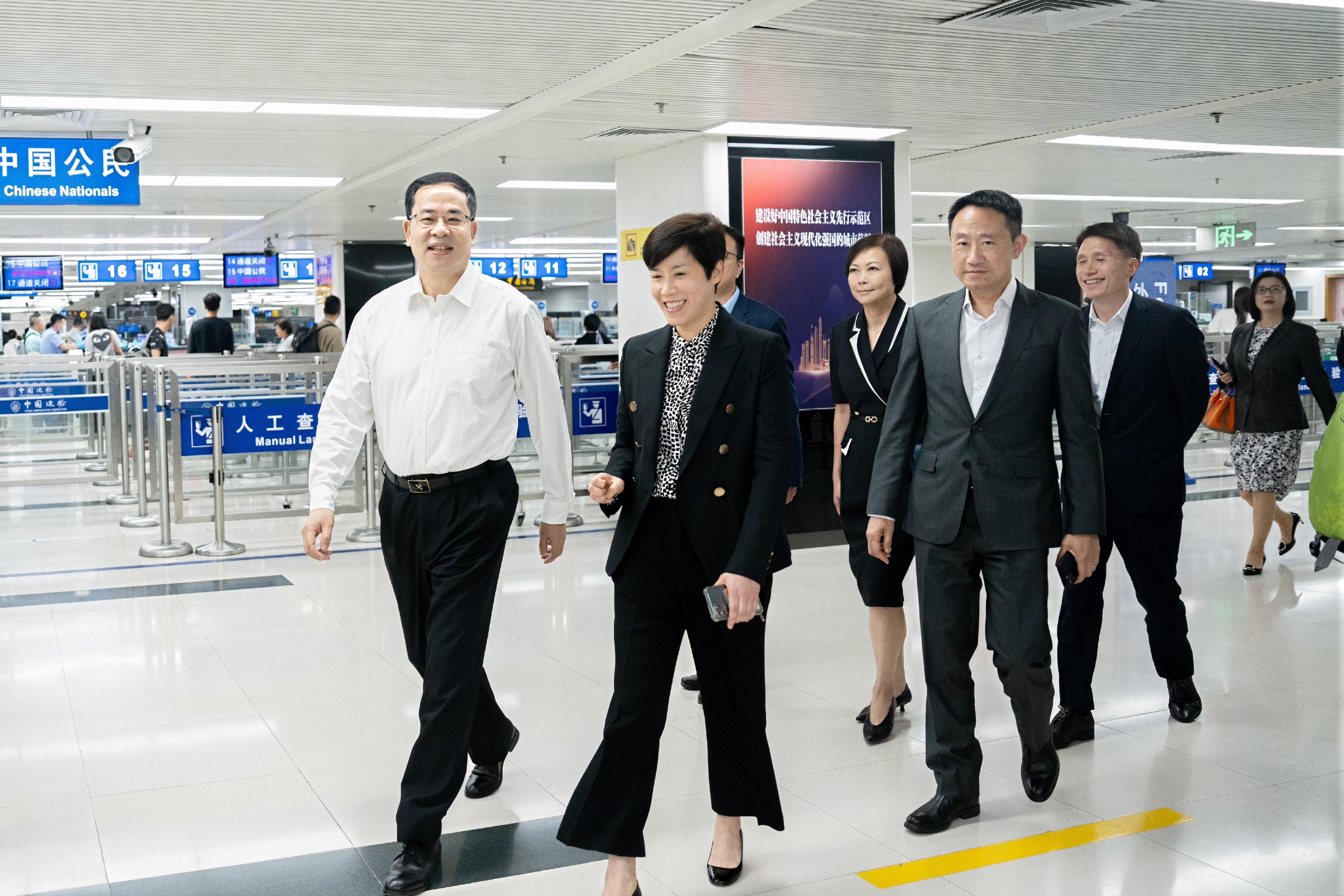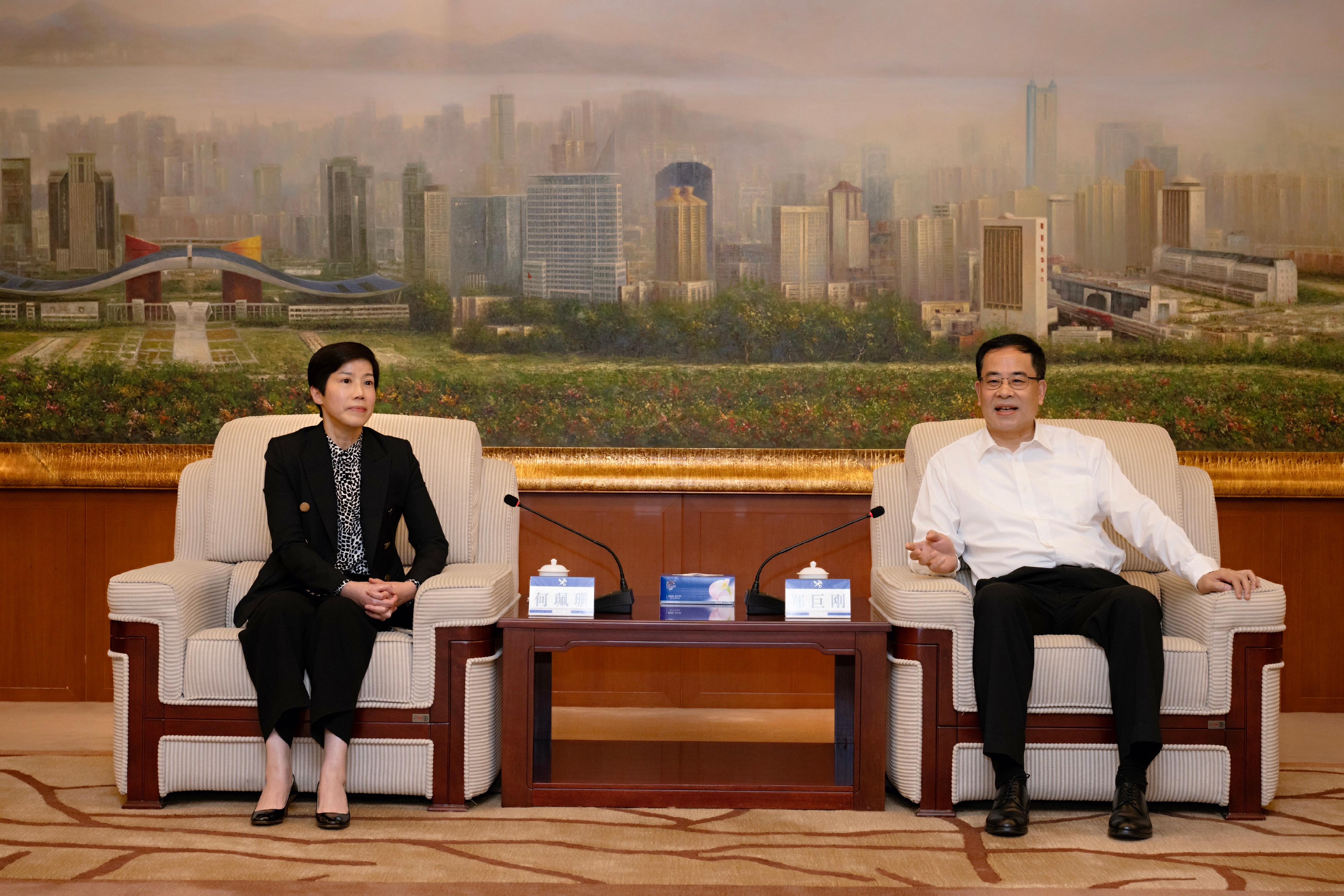Policy Address: Boosting the economy, supporting business
Delivering his second Policy Address today (October 25), the Chief Executive, Mr John Lee, outlined a range of measures to boost Hong Kong’s economy and support businesses, taking full advantage of Hong Kong’s strengths under “one country, two systems”.
The initiatives include Hong Kong’s development of the “eight centres” outlined in the National 14th Five-Year Plan.
To consolidate Hong Kong’s status as an international financial centre, one of the “eight centres”, it is dependent on a vibrant stock market. Responding to the report of the Task Force on Enhancing Stock Market Liquidity, the Government accepted its recommendations and would implement initiatives including reducing stamp duty on stock transfer, reviewing stock trading spread and reducing market data fees. They also include reforming GEM (formerly known as the Growth Enterprise Market), for which the Hong Kong Exchanges and Clearing Limited would implement the revised Listing Rules for GEM in the first quarter of 2024 after considering public views. These would include new listing routes for research and development (R&D)-focused companies and streamlining the transfer mechanism to the Main Board.
Other measures on reinforcing Hong Kong’s competitiveness as a financial centre include:
- strengthening the offshore Renminbi business;
- deepening financial co-operation in the Guangdong-Hong Kong-Macao Greater Bay Area (GBA);
- establishing a new platform to expand fund distribution; and
- promoting the development of green and sustainable finance in Hong Kong.
Attracting companies to Hong Kong remains a central policy priority. The Office for Attracting Strategic Enterprises (OASES), introduced in last year’s Policy Address, has been well received with 30 companies planning to establish a base or expand their operations in Hong Kong, investing about $30 billion and adding some 10 000 employment opportunities. OASES will continue its good work, reaching out to at least 300 strategic enterprises in 2024, with a focus on those specialising in advanced technology, innovation and other strategic industries. These are pertinent to Hong Kong’s development of the “eight centres”.
So, too, is Hong Kong’s arrival as a “headquarters economy”, attracting companies to establish their headquarters or divisional operations in the city. And legislative amendments will be introduced into the Legislative Council next year to help overseas incorporated companies re-domicile in Hong Kong, especially those with a business focus in the Asia-Pacific region. Foreigners working in overseas companies in Hong Kong will be eligible for multiple-entry visas, of two or more years, to the mainland, with fast-track processing of their applications.
Alongside attracting strategic enterprises, the Government is committed to bringing in, and retaining, talent. A Hong Kong Talent Engage office will open at month’s end to support incoming talents and follow up with their development and needs. Next year, a “Global Talent Summit cum Guangdong-Hong Kong-Macao Greater Bay Area High-quality Talent Development Conference” will be held to promote co-operation in talent recruitment throughout the GBA.
In addition, the Top Talent Pass Scheme will add eight prominent Mainland and overseas institutions to its network for attracting global talent. A Capital Investment Entrant Scheme will also be implemented, details of which will be announced by the end of this year. The scheme will allow eligible investors who make investments of $30 million or above in assets such as stocks, funds, bonds and so on (excluding real estate) to apply for entry into Hong Kong.
Hong Kong will augment its longstanding status as an international trade centre, another one of the “eight centres”. While maintaining close ties with long-established markets in Europe and the United States, the Government will explore and tap into the new markets of Belt and Road countries, including those of the Association of Southeast Asian Nations (ASEAN), the Middle East, Central Asia and Africa.
Hong Kong has been negotiating investment agreements with Bahrain, Bangladesh and Saudi Arabia and would soon sign an investment agreement with Türkiye. Hong Kong has also been negotiating a free trade agreement with Peru. In addition, Hong Kong has applied for accession to the Regional Comprehensive Economic Partnership, comprising Mainland China, the 10 member states of ASEAN, as well as Japan, Korea, Australia and New Zealand.
Deepening economic and trade co-operation with the Mainland is equally important. Hong Kong will organise more outbound missions with Hong Kong and Mainland enterprises to promote business opportunities for Hong Kong’s professional services together with Mainland partners. The Government will also organise visits to the GBA for overseas enterprises operating in Hong Kong. In addition, more consultant offices would be set up along the Belt and Road by Invest Hong Kong and the Hong Kong Trade Development Council.
Advanced logistics is essential for an international trade centre, an Action Plan on Modern Logistics Development would be published before year’s end. The Government would formulate strategies and action measures to promote the logistics industry along the directions of smart development, modernisation, green and sustainability, internationalisation and facilitation.
Beyond finance, trade, logistics, shipping and professional services sectors, the Government will continue to develop emerging strategic industries. These included innovation and technology, cultural and creative, pharmaceutical research and development, Chinese medicine and new-energy transport industries.
Small and medium enterprises (SMEs) are critical to both Hong Kong’s traditional and emerging industries. To help them remain competitive in today’s technology-driven economy, the Government would establish an E-commerce Development Task Force. It will help SMEs develop e-commerce business on the Mainland. In addition, Cyberport will launch its Digital Transformation Support Pilot Programme by year’s end, subsiding SMEs in the retail and catering sectors in adopting electronic payment and other digital initiatives.
Hong Kong also enjoys the nation’s support as an international innovation and technology centre. To further that goal, the Government would:
- set up the New Industrialisation Development Office to help strategic enterprises develop their businesses, to assist the manufacturing sector in its upgrading and transformation by making use of innovation and technology and to support the growth of start-ups;
- establish the Hong Kong Microelectronics Research and Development Institute in 2024 to work with universities, R&D centres and the industry, providing advanced infrastructure and hardware support;
- expedite the establishment of an artificial intelligence (AI) supercomputing centre at Cyberport;
- create a $10 billion New Industrialisation Acceleration Scheme to support enterprises setting up production facilities in Hong Kong. The Scheme will target enterprises specialising in life and health technologies, AI and data science, advanced manufacturing and new-energy technologies;
- support the transformation of R&D outcomes from start-ups by doubling the maximum funding provided for the Technology Transfer Office of each specified university to $16 million;
- develop a third Science Park InnoHK cluster focused on advanced manufacturing, materials, energy and sustainable development; and
- promote the cross-boundary data flow of financial and medical services within the GBA.
Despite Hong Kong’s many challenges in the near term, the Policy Address measures would help Hong Kong realise a future as bright, energetic, competitive and prosperous as ever. read more




